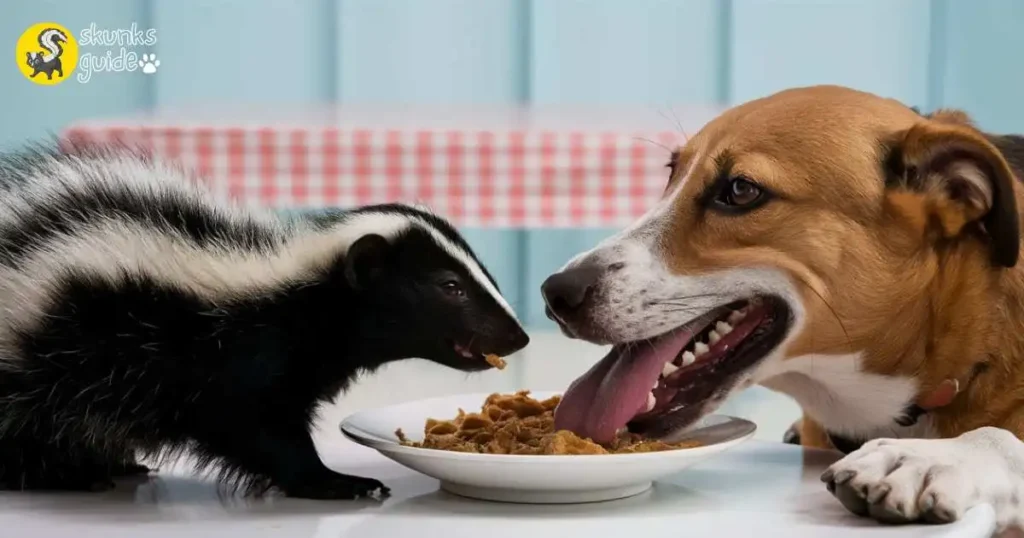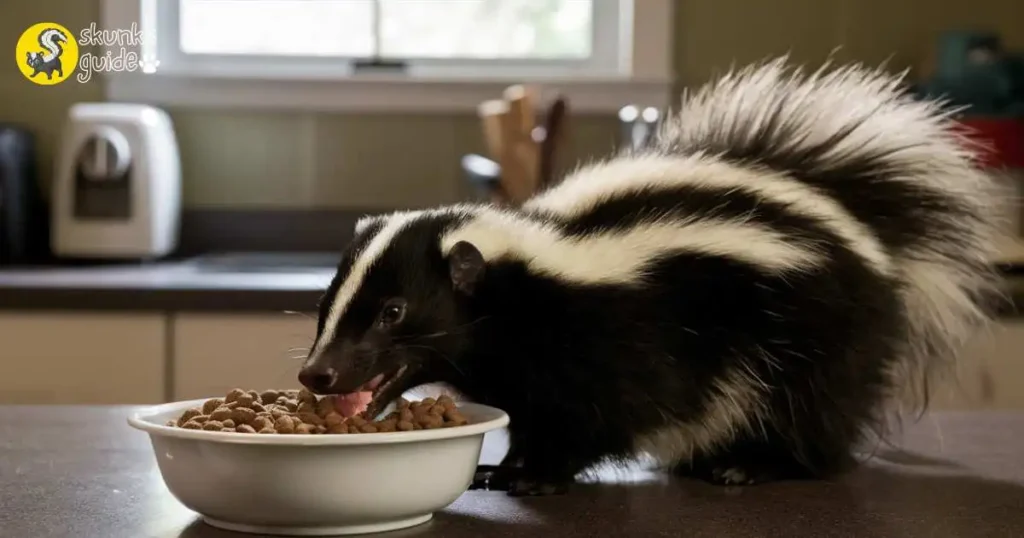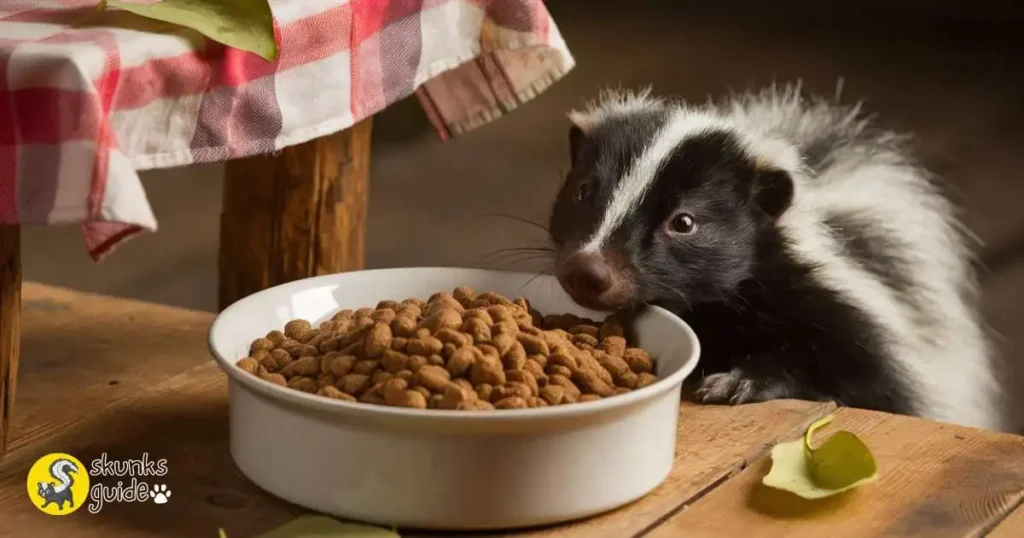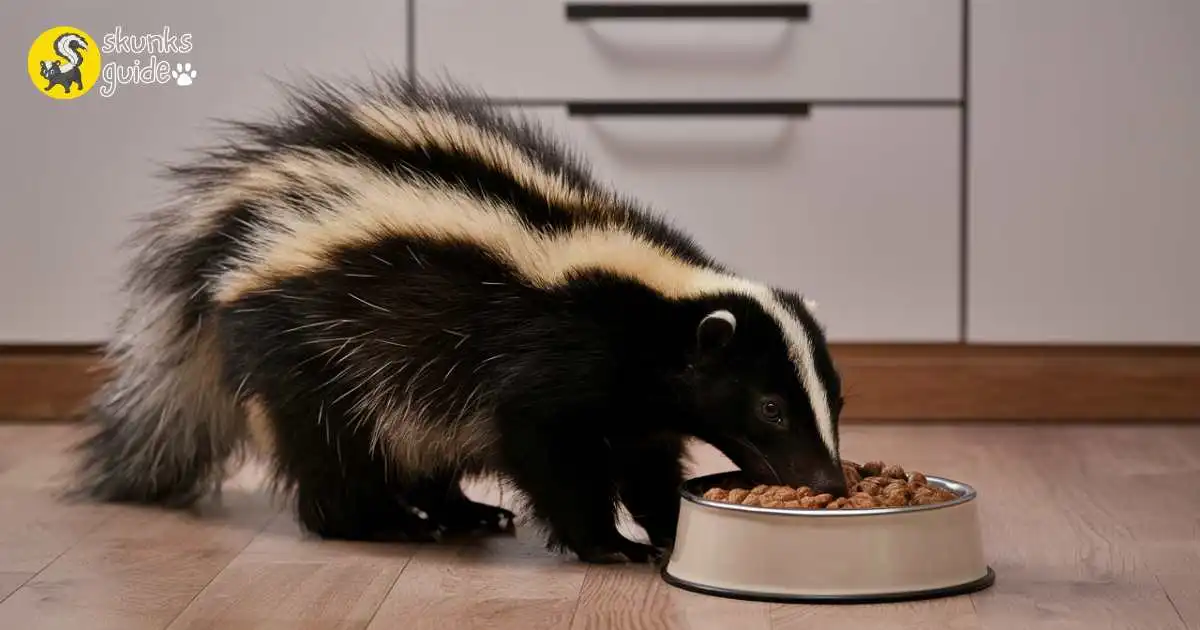Can Skunks Safely Consume Dog Food?
Last updated on November 4th, 2024 at 07:09 am
Yes, skunks can eat dog food! From my experience as a skunk pet owner and wildlife expert, I’ve learned that these animals are opportunistic eaters. They eat everything from insects to fruits and, if they find it, your dog’s food too. This can attract them to your yard if pet food is left out. Keep reading to learn how to keep your dog food safe from these nighttime visitors!
Dog Food And Skunks
Skunks do eat dog food. It is an easy meal for them. They come out at night to find food. If they find dog food outside, they will eat it. This can lead to problems for both skunks and dogs.

Attracting Skunks With Dog Food
Leaving dog food outside is like inviting skunks over. They have a strong sense of smell. Dog food smells good to them. When skunks eat dog food, they might keep coming back. This can make them lose their fear of people. It can also lead to more skunks coming into your yard. Here are ways dog food attracts skunks:
- Smell: Dog food has a strong smell. It can attract skunks from far away.
- Easy meal: Skunks find it easy to eat dog food. It is often left outside in bowls.
- Safe: Eating dog food is safe for skunks. They do not have to hunt.
Here is a table showing why skunks like dog food:
| Reason | Description |
|---|---|
| Smell | It smells good. |
| Easy Meal | It’s easy to find and eat. |
| Safe | No need to hunt. |
Potential Dangers
Having skunks around can be risky. They can cause problems for you and your pets. Here are some dangers:
- Diseases: Skunks can carry diseases. These can spread to pets and people.
- Bites: Skunks might bite if they feel scared. This can be dangerous.
- Smell: Skunks spray a bad smell. This smell is hard to get rid of.
It is important to keep dog food away from skunks. Here are tips to keep skunks away:
- Keep dog food inside. Only give your dog what it can eat.
- Secure trash cans. Skunks look for food in the trash too.
- Use lights outside. Skunks do not like bright lights.
By following these tips, you can keep skunks away. This keeps everyone safe.
Preventing Skunks From Eating Dog Food
Skunks may surprise you by eating dog food. These black and white creatures often sneak into backyards looking for easy meals. To keep them away from your pet’s food, you need smart strategies. This post covers how to prevent skunks from turning your dog’s bowl into their dinner plate.

Secure Storage
Keeping dog food safe is key to avoiding skunk visits. Start by storing pet food in airtight containers. These should be sturdy and preferably made of metal or thick plastic that skunks can’t chew through. Keep these containers in a place that skunks can’t access, like a locked shed or your home. Here’s a quick guide to secure storage:
- Choose containers with tight-fitting lids.
- Store in a high place, away from skunk reach.
- Never leave bags of pet food outdoors.
Consider a bin with a locking mechanism for extra security. This table summarizes the best practices:
| Storage Tip | Reason |
|---|---|
| Airtight Containers | Prevents smells from attracting skunks |
| Lockable Bins | Adds an extra layer of security against wildlife |
| Indoor Storage | Keeps food out of skunks’ natural habitat |
Feeding Pets Indoors
Another effective method is to feed your pets inside. This simple change can greatly reduce the chance of skunks wandering near your home. Always feed pets during specific times and avoid free-feeding. This ensures no food is left unattended, tempting skunks. Follow these steps for successful indoor feeding:
- Set a feeding schedule for your pets.
- Place food bowls away from doors or pet flaps.
- Monitor your pets to ensure they finish their food.
Creating a designated feeding area inside helps pets understand where to expect food. This habit keeps your outdoor space free from food scents that attract skunks.
Removing Leftover Food
After your pet finishes eating, it’s crucial to remove any leftover food immediately. Leftovers can attract skunks even after your pet is done eating. Clean the feeding area to remove any traces of food, including crumbs or spills. Here are some additional tips:
- Wash food bowls daily to eliminate odors.
- Dispose of uneaten food in a secure trash can.
- Regularly check outdoor areas for forgotten snacks or treats.
Cleanliness is your ally in keeping skunks away. A tidy feeding area is less likely to become a skunk’s next meal spot.
Natural Skunk Deterrents
Do skunks eat dog food? Yes, they do. Skunks often sneak into backyards looking for easy meals and dog food is a top choice. To keep these striped visitors away, consider natural skunk deterrents. These methods are safe for your pets and garden. They also help maintain a skunk-free zone. Let’s explore some effective strategies to keep your furry friends’ food to themselves.
Planting Skunk-repelling Plants
Skunks have sensitive noses. Planting certain types of foliage can discourage them from entering your space. Here are some plants known to repel skunks:
- Marigolds: These bright flowers give off a scent that skunks dislike.
- Citrus Trees: Skunks tend to avoid the smell of citrus fruits.
- Mint: The strong aroma of mint is another natural deterrent.
Consider this table of plants for a skunk-free garden:
| Plant | Scent Strength | Effectiveness |
|---|---|---|
| Marigolds | High | Strong |
| Citrus Trees | Medium | Moderate |
| Mint | High | Strong |
Plan your garden layout to include these plants around the perimeter. It’s a natural barrier that looks good too. Remember to keep dog food indoors or in sealed containers to avoid attracting skunks in the first place.
Using Motion-activated Sprinklers
Motion-activated sprinklers are a smart way to scare skunks away. They work by detecting movement and spraying water. This sudden action frightens skunks and other critters. Here’s why they are effective:
- Surprise Factor: Skunks are nocturnal and the unexpected water spray can startle them.
- Consistency: These devices work all night, providing constant protection.
- Humane: Sprinklers offer a safe way to keep skunks at bay without harm.
Setting up your sprinkler system is easy. Place them around your garden or near potential food sources. Be sure to adjust the sensitivity settings to target skunks, not smaller animals. This method keeps your yard watered and skunk-free.
What To Do If Skunks Keep Eating Dog Food

Do skunks eat dog food? Yes, they certainly do! These black and white creatures often sneak into backyards in search of easy meals, and dog food is a favorite. If you’re facing a skunky situation where these critters are feasting on your pup’s kibble, you’ll want to take action. Let’s explore some effective steps to deter these unwelcome diners.
Contacting Pest Control
When skunks repeatedly invade your space, it’s time to call in the experts. Pest control professionals can help in several ways:
- Assessment: They’ll check your property to find how skunks get in.
- Trapping: Pros can safely trap and relocate skunks.
- Prevention advice: They’ll suggest ways to keep skunks away.
Consider the following table for a quick guide on choosing a pest control service:
| Service Features | Benefits |
|---|---|
| Experience with skunks | Targeted, effective solutions |
| Humane methods | Skunks are safely relocated |
| Follow-up support | Long-term peace of mind |
Remember, choosing a licensed and humane service is crucial for the well-being of the skunks and your family’s safety.
Sealing Off Entry Points
Preventing access is key to stopping skunks from dining on dog food. Take these steps to seal off entry points:
- Inspect your yard: Look for holes or gaps where skunks may enter.
- Repair fences: Fix any holes or weak spots in your fencing.
- Secure garbage lids: Keep trash cans tightly closed.
Creating barriers can be highly effective. Here’s how to make your yard less inviting:
- Install a mesh fence: Bury it a foot deep to prevent digging.
- Use gravel or rocks: Place them around the base of your home.
- Keep the yard clean: Remove pet food and secure compost bins.
Act quickly to protect your pet’s food and maintain a skunk-free yard!
Conclusion
Wrapping up, it’s clear that skunks may occasionally raid dog food supplies. Vigilance in storage and feeding habits is key to preventing these encounters. Ensuring pets’ meals are secure not only protects your dog’s diet but also deters unwanted wildlife visits.
Stay alert and keep those furry friends—and their food—safe.

